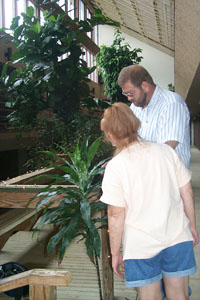Retirement Village Using IPM Methods to Rid Pests from Interior Plants
Retirement Village Using IPM Methods to Rid Pests from Interior Plants

Something was damaging and even killing plants inside the atriums of the Lakeland Wesley Village retirement community in Marshall County.
“Everything was dying and we decided something had to be done about it,” said Bill Holt, a member of the residents’ council.
A call to the Marshall County office of the University of Kentucky Cooperative Extension Service and subsequent visit from Lincoln Martin, county Extension agent for agriculture/natural resources and Bob Anderson, UK horticulture specialist, revealed the culprit to be mealybugs.
Mealybugs appear to be little tufts of cotton on the leaves and stems. They are most common on the undersides of leaves and at the point where a leaf attaches to a stem.
After discussions with UK specialists, the residents’ council decided to opt for a biological control approach. A specific ladybug, often called mealybug lion or mealybug destroyer that feeds on the mealybugs, was released. Once the mealybugs are gone, the lions will not persist unless there are other prey such as scale and aphids.
“We decided this would be the cheapest and best way to go,” Holt said.
With residents living so close to the plants, using some form of spray was not an
option, Martin said. Apartments in two long buildings open into the atriums. The cost
also would have been prohibitive, Holt said.
Anderson, UK Extension horticulture specialist, said the village’s interiorscape was unique in Kentucky and something that would more likely be found in the south. He said it was as good a design for houseplants as he has seen.
Generally, predatory insects aren’t used in greenhouses except for whitefly control in tomatoes and peppers, Anderson said. With flowers, they are generally not in a greenhouse long enough to build up populations of the predatory insects in time.
They are being used successfully in interiorscapes, he said, but oftentimes residents don’t want any type of bugs, good or bad.
Using predatory insects provides the opportunity to be pesticide free, Anderson said.
Mealybug lions rank in the middle range of success, Anderson said. Also, the plants at the village are older and many are more susceptible to mealybugs than what would be found in interiorscapes today.
Anderson said he plans to make a return visit to the facility soon to see what kind of control they are having. Residents say he will notice a change.
“They look a lot better than they did before, you could turn them over and the leaves were covered with them,” Holt said. “It would just be white.”
Shelia Shropshire, another council member, said in addition to the plants looking much better they rarely see any of the ladybugs around.
The mealybug lions were purchased through a Tennessee company. There are a number of biological supply houses that supply these ladybugs and other beneficial insects.